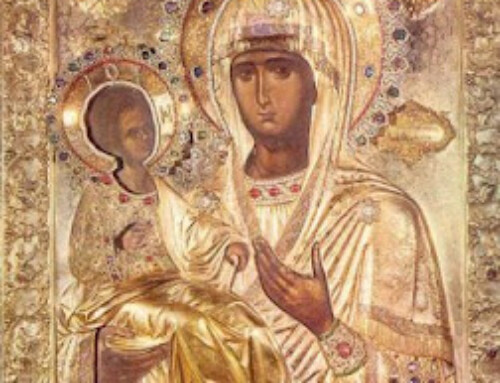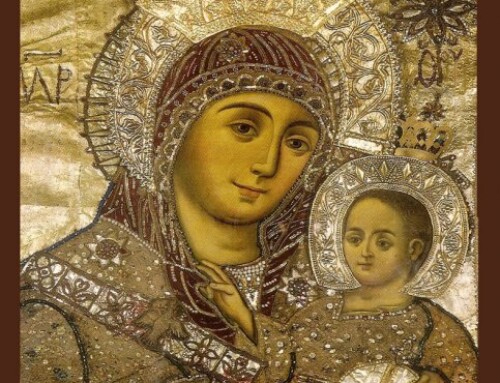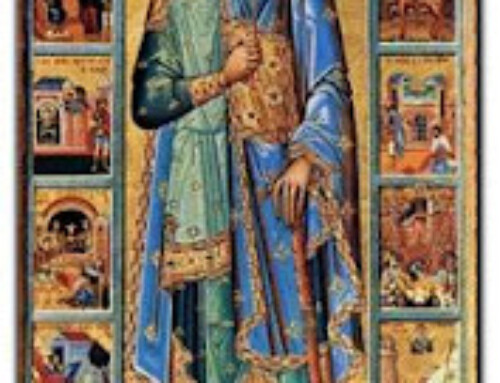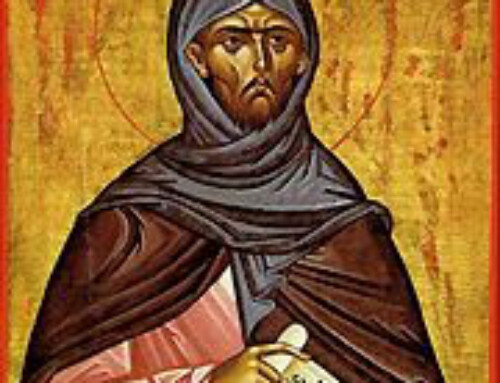Word Magazine April 2001 Page 12-15
THE DISPUTE BETWEEN ST. PAUL
AND ST. BARNABUS OVER THE YOUNG MAN JOHN MARK: ACTS 15:36-40
By Stephen Holley
In Acts 15:36 FF, we read that St. Paul and his former mentor, Barnabas, decided to return to the mission field from which they had just come. They had gone previously on what has come to be known as “the first missionary journey of St. Paul,” wherein they visited Gentile cities and preached the Gospel of Jesus Christ. They began in the city of Antioch of Syria where the Holy Spirit called for the separation of St. Paul and Barnabas for this special work of reaching the Gentiles. From there they journeyed by ship to Salamis and Paphos on the island of Cyprus. Finishing there, they went again by ship to the mainland of Asia Minor, landing at the city of Perga. From there they traveled on foot to Pisidian Antioch, Iconium, Lystra and Derbe. From Derbe they retraced their steps through the same cities, ordaining elders in all the churches they had established. Reaching Attalia, another port city just two or three miles southwest of
Perga, they sailed home to Antioch of Syria.
During this first missionary endeavor, the two men suffered many hardships together. St. Paul was stoned and left for dead at Lystra; they were withstood by a sorcerer named Elymas at Paphos and they were deserted by Barnabas’ cousin, John Mark at Pamphylia. At the same time, however, they also experienced many miracles wrought by the hand of the Holy Spirit during this premier work which caught the attention of many and caused a majority of that many to believe the Gospel.
Now they were ready to go back and strengthen the brethren to whom they had preached and to see how they were doing amidst so hostile an atmosphere. None of the hardships and dangers which they suffered was able to keep them from going back and confirming their previous work, except for one incident which happened to them, the departing of John Mark from the party. In Acts 15:36ff, we read:
And after some days, Paul said to Barnabas, “Let us, I pray, surely return to the brethren according to every city in which we have preached the Word of the Lord to see how they are doing.” And Barnabas desired also John who is called Mark to accompany them. But Paul reckoned that the one who departed from them from Pamphylia and who did not go with them unto the work, this one should not accompany them. And a paroxysm came to pass between them so that they separated themselves from one another, Barnabas, on the one hand, taking Mark and sailing to Cyprus while, on the other hand, Paul, choosing Silas, left, being commended to the grace of the Lord by the brethren.
As mentioned previously, Barnabas had been St. Paul’s mentor and sponsor for Chrismation into the Church. When all the other believers were skeptical concerning St. Paul’s conversion on the Damascus road, Barnabas alone was willing to vouch for the sincerity of the conversion, risking his own credibility within the community of faith for St. Paul’s sake. In the chapters of Acts previous to this it had always been “Barnabas and Saul” when they were mentioned together, but when St. Paul was “come of age” spiritually, the order changed to “Paul and Barnabas.” Barnabas exhibited the same humble spirit as St. John the Baptist when he had said concerning the Lord Jesus’ training ministry, “He must increase, but I decrease” (Jn. 3:30). Why was it that this humble man, whose name means “Son of Consolation,” let this issue separate him from the one for whom and with whom he had risked his life? What was it that John Mark did to cause so great a rift between two such good friends? The rest of the Book of Acts and the New Testament are filled with the events of St. Paul’s life and his writings, but we never hear the name of Barnabas again after Acts 15:39. We do hear again, however, of John Mark, and this may provide the key to this minor mystery. Let us look at some of the pertinent Scripture passages concerning these events for a plausible explanation of the separation of these two good Christian friends who meant so much to each other.
First, in Acts 13:5 we are introduced to John Mark’s presence on this initial missionary endeavor:
“And they, being in Salamis, began to preach the Word of God in the Synagogues of the Jews. And also they had John as an attendant.” When examining the Greek word from which “attendant” is derived, it appears that John Mark was the “gofer” of the missionary party.
At this point in the journey it was still “Barnabas and Saul” (see vs. 7) so that Barnabas was the leader of the group. John Mark was Barnabas’ cousin, probably the reason he was asked to come along in the first place, to gain some experience in the propagation of the Gospel among the Gentiles. As is common in the world of apprenticeship, the beginner is asked to do all the small tasks that must be done to complete the work properly. It is reminiscent of the Apostles earlier in the Book of Acts calling for gifted men who were “full of the Holy Spirit” to settle the disputes among the Greek and Hebrew widows over the fairness of the ministry to them: the Apostles thought it not fit that they leave the ministry of the Word of God to do the waiting on the tables.
One can imagine the many daily tasks that needed to be done —thankless tasks, repetitive “busy work,” that kept John Mark out of the sight of those to whom St. Paul and Barnabas were ministering. There were no accolades or recognition for him; he was out of sight and out of mind. One of his duties was taking notes of daily activities and of the sermons being preached, which were to be preserved by the Holy Spirit for future generations of the Church. At the end of the long day the scribe then had to transcribe his notes into a continuing journal, connecting each day with a proper segue and making sure the journal made sense to anyone reading it. John Mark was still working while the others rested and prepared for the next day’s activities.
It appears that a transition takes place in vs. 9, where we read, “And Saul (this one is also called Paul), being filled with the Holy Spirit, stared straight into him.” The transition is from “Barnabas and Saul” to “Paul and Barnabas” for, in vs. 13 we read, “And when those who were around Paul set sail from Paphos, they went unto Perga in Pamphylia, and John departing from them returned unto Jerusalem.”
The change in leadership may have been a major factor in John Mark’s decision to leave the expedition. If his job had been tedious, boring and unrewarding under his cousin’s leadership, what would it be now that Paul had taken over as leader? Whatever the cause, it was serious enough for John Mark to desert his post while in the middle of the work!
The Holy Fathers see this parting of the ways of St. Paul and Barnabas not as a bad thing but as a positive action of Divine Providence. Concerning their disagreement over John Mark in Acts 15:35ff, St. John Chrysostom writes:
Observe again their humility, how they let others also take part in the preaching. “And some days after Paul said unto Barnabas, ‘Let us go again and visit our brethren in every city where we have preached the word of the Lord, and see how they do.’ And Barnabas determined to take with them John, whose surname was Mark. But Paul thought it not good to take him with them, who departed from them from Pamphylia, and went not with them to the work. And the contention (or exasperation) was so sharp between them, that they departed asunder one from the other” (v. 36-39). And there seems indeed to be exasperation (“paroxusmo”), but in fact the whole matter is a plan of the Divine Providence, that each should receive his proper place: and it behooved that they should not be upon a par, but the one should lead, and the other be led … If the exasperation were in seeking his own, and contending for his own honor, this might well be reproved: but if wishing, both the one and the other, to instruct and teach, the one took this way and the other that, what is there to find fault with? . . . And observe how Paul impeaches Mark, and gives the reason. For of his exceeding humility he reverenced Barnabas, as having been partner with him in so great works, and being with him: but still he did not so reverence him, as to overlook what was necessary. Now which of them advised best, it is not for us to pronounce: but thus far we may affirm, that it was a great arrangement of Providence, if these were to be vouchsafed a second visitation, but those were not to be visited even once (Homily XXXIV on Acts 15:35ff).
Even in his seeing this parting asunder in so positive a manner, St. John Chrysostom still acknowledges the fact that there was reproof rightly directed at John Mark for his having abandoned ship in Cyprus. However, from a less positive standpoint, the anonymous writer of The Journeyings and Martyrdom of St. Barnabas, the Apostle describes the parting of the ways from John Mark’s point of view, saying:
Great contention, therefore, arose between them. And Barnabas urged me also to accompany them, on account of my being their servant from the beginning … But Paul cried out against Barnabas, saying: “It is impossible for him to go with us … If thou wilt take John who also is surnamed Mark with thee, go another road; for he shall not come with us.” And Barnabas coming to himself, said: “The grace of God does not desert him who has once served the Gospel and journeyed with us. If, therefore, this be agreeable to thee, Father Paul, I take him and go.” And he said: “Go thou in the grace of Christ, and we in the power of the Spirit.”
This is still the point of the inquiry: What made St. Paul think John Mark not worthy of accompanying him on the return voyage? St. Paul may have felt that John Mark was not mature enough to handle the duties he would be required to perform, were he to go with them a second time. Perhaps he had not learned the lesson taught by our Lord in the Upper Room on the eve of His Crucifixion: “If I, then, your Lord and Master, have washed your feet, yet also ought to wash one another’s feet … The servant is not greater than his lord; neither he that is sent greater than he that sent him” (John 13:14-17).
John Mark also had not learned the lesson that St. Paul had to teach the Church at Corinth concerning the gifts of the Spirit. There, it seems, many in that congregation desired to have the more spectacular gifts, most notably, speaking in tongues, and no one wanted to possess or exercise the more humble gifts. Thus, St. Paul addressed that issue in a most pointed manner:
For the body is not one member, but many … Those members of the body which seem to be more feeble, are necessary: And those members of the body, which we think to be less honorable, upon these we bestow more abundant honor; and our uncomely parts have more abundant comeliness. For our comely parts have no need: but God hath tempered the body together, having given
more abundant honor to that part which lacked: That there should be no schism in the body; but that the members should have the same care one for another. And whether one member suffer, all the members suffer with it; or one member be honored, all the members rejoice with it. Now ye are the body of Christ, and members in particular (1 Cor. 12:14-27).
Notice the common theme that runs through these two lessons of the Christian life: greater honor is accorded the one who takes the lesser position. This is in total opposition to the world’s standard of the greater being of higher importance and honor. In the parable of the wedding guest (Luke 14:7ff), Christ teaches us that humility in this life is the only key to riches and honor in the Kingdom of Heaven! This is the lesson that John Mark had not learned, although it was a crucial lesson to be mastered when part of a missionary team trying to preach and witness to the Gospel of our Lord Jesus Christ!
The story, happily, does not end here for John Mark as it does for Barnabas. We noted earlier that Barnabas is not mentioned again in the New Testament following Acts 15:39, but such is not the case for John Mark. We might be left to believe that St. Paul and Barnabas parted in an unfriendly manner and that Barnabas’ not being mentioned again in the New Testament was to his discredit; this is not the case at all. Our Father in the faith, St. John Chrysostom, continuing in his exposition of the Book of Acts, writes concerning this parting of the ways:
What then? Did they withdraw in enmity? God forbid! In fact you see after this Barnabas receiving many encomiums from Paul in the Epistles. There was “sharp contention,” it says, not enmity nor quarreling. The contention availed so far as to part them … yielding each to the other: for Barnabas wished Paul’s plan to stand, therefore withdrew; on the other hand, Paul wished the other’s plan to stand, therefore he withdrew … To Mark this contest was exceedingly beneficial. For the awe inspired by Paul converted him, while the kindness of Barnabas caused that he was not left behind: so that they contend indeed, but … the disciple was corrected by the contention of the teachers: so far was he from being offended thereby. For if indeed they did this with a view to their own honor, he might well be offended: but if for his salvation, and they contend for one and the same object, to show that he who honored him had well determined, what is there amiss in it (Homily XXXIV on Acts 15:35ff)?
Note that St. John Chrysostom says that all of this worked out to John Mark’s correction and to his salvation. We certainly know this by the fact that St. Paul says very explicitly to his son in the faith, Timothy, “Do thy diligence to come shortly unto me: For Demas hath forsaken me, having loved this present world, and is departed unto Thessalonica; Crescens to Galatia, Titus unto Dalmatia. Only Luke is with me. Take Mark, and bring him with thee: for he is profitable to me for the ministry.” It is of great importance here to notice that St. Paul is near the end of his life when he writes this epistle to Timothy and that some of his fellow-workers have deserted him while he has sent others to their ministries. In this context of abandonment, St. Paul calls for John Mark, of whom he says, “he is profitable to me for the ministry.” This is quite a turn-around for one who was considered unprofitable only a few years before. How did this turn-around occur so that St. Paul could have such a different and much higher opinion of Mark? It occurred because John Mark realized the truth of the lessons outlined above. How did he learn them? He humbled himself under the mighty Hand of God that he might be exalted in due time (1 Pet. 5:6). It was at the feet of St. Peter that he learned his lessons and humbled himself.
In I Pet. 5:13 we read, “The church that is at Babylon, elected together with you, greeteth you; and so doth Mark, my son.”
Going to Babylon meant being on another “missionary journey” for John Mark. As such, accompanying one of the original twelve apostles, he would be thrust once again into the role of “attendant” or “go-fer.” Since St. Peter refers to John Mark as “my son,” it is well to assume that John Mark was a good and profitable servant on this undertaking. He would, of course, dutifully take notes of the preaching of St. Peter every day and faithfully transcribe those notes each night. In humbling himself to this tedious and repetitive task, he was to be rewarded in more ways than one. First of all, we know that St. Peter never wrote a “Gospel according to St. Peter,” but there is a “Gospel according to St. Mark,” the second book of the New Testament Canon. This Gospel of St. Mark is popularly thought to be, in truth, a Gospel according to St. Peter because it is composed largely of the preaching of St. Peter, which St. Mark set to writing for us. The ancient witnesses do attest that St. Mark’s Gospel is really the preaching of St. Peter. This is reward enough in itself, to have been chosen to author one of the Four Blessed Gospels of the Life of our Lord Jesus Christ and to have one’s name eternally attached to it!
The second reward of John Mark’s humbling of himself was, of course, his being asked for by St. Paul and being described by St. Paul as being “profitable for the ministry.” This meant that he had fully and completely re-crossed that bridge that may so easily have been burned and been made uncrossable!
We can learn many lessons from the initial failure and subsequent successes of John Mark, not the least of which is humility as the key to success in the Christian life. As John Mark felt it “beneath his dignity” to be a “go-fer” for St. Paul initially, but retraced his steps and crossed old bridges successfully, so we can have the opportunity to face old challenges anew. Even though the standards are so much higher in the Christian ministry than in the world, the world does not know Grace and Mercy as does our Blessed Lord Jesus Who is the Light unto our paths, leading us back to those places where we had once failed!
PAUL’S THIRD AND FOURTH JOURNEYS
(Acts 18:23-21:16;27-28:16)
Reader Stephen Holley is a member of St. Michael Antiochian Orthodox Church, Whittier, CA.





